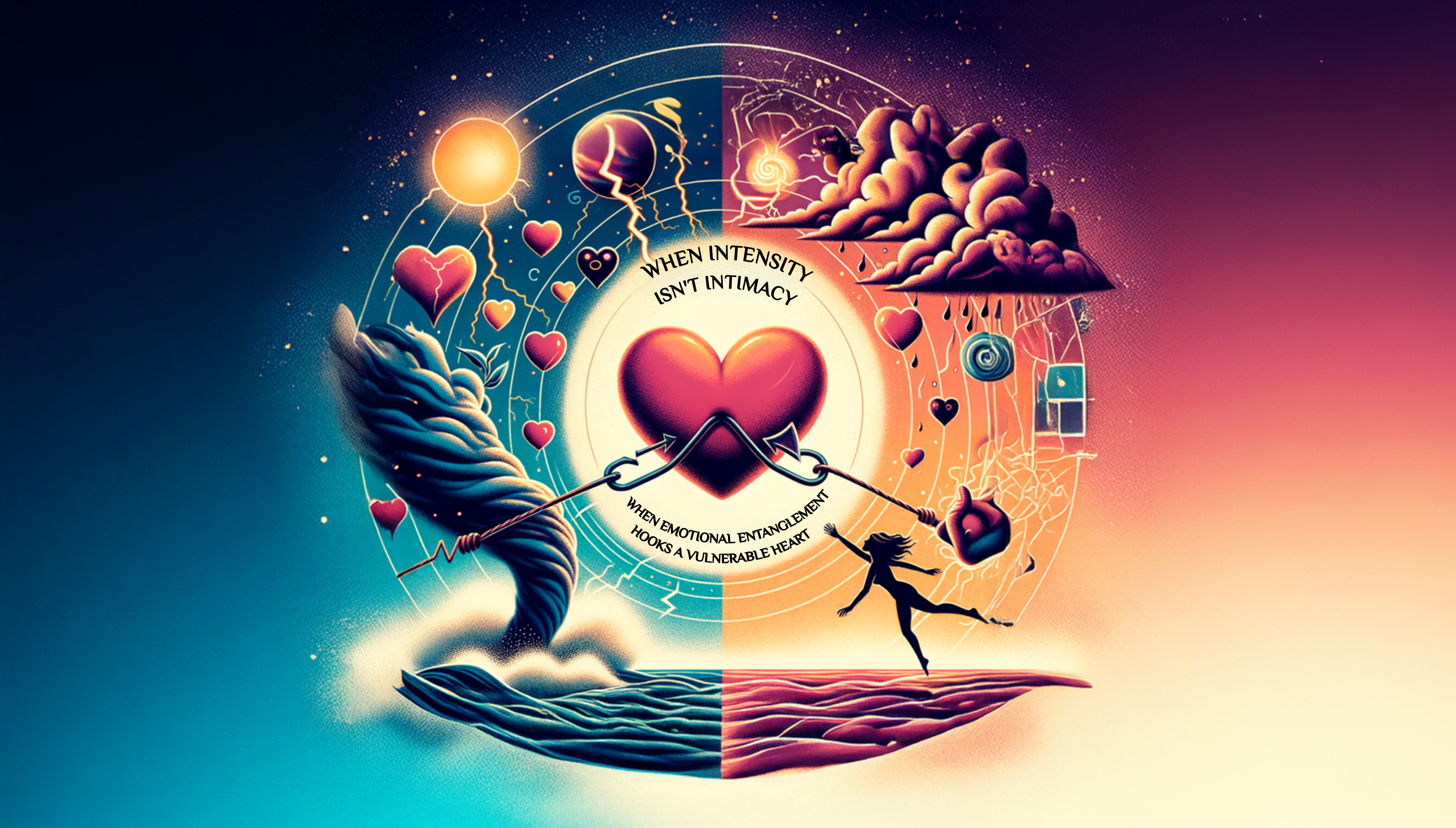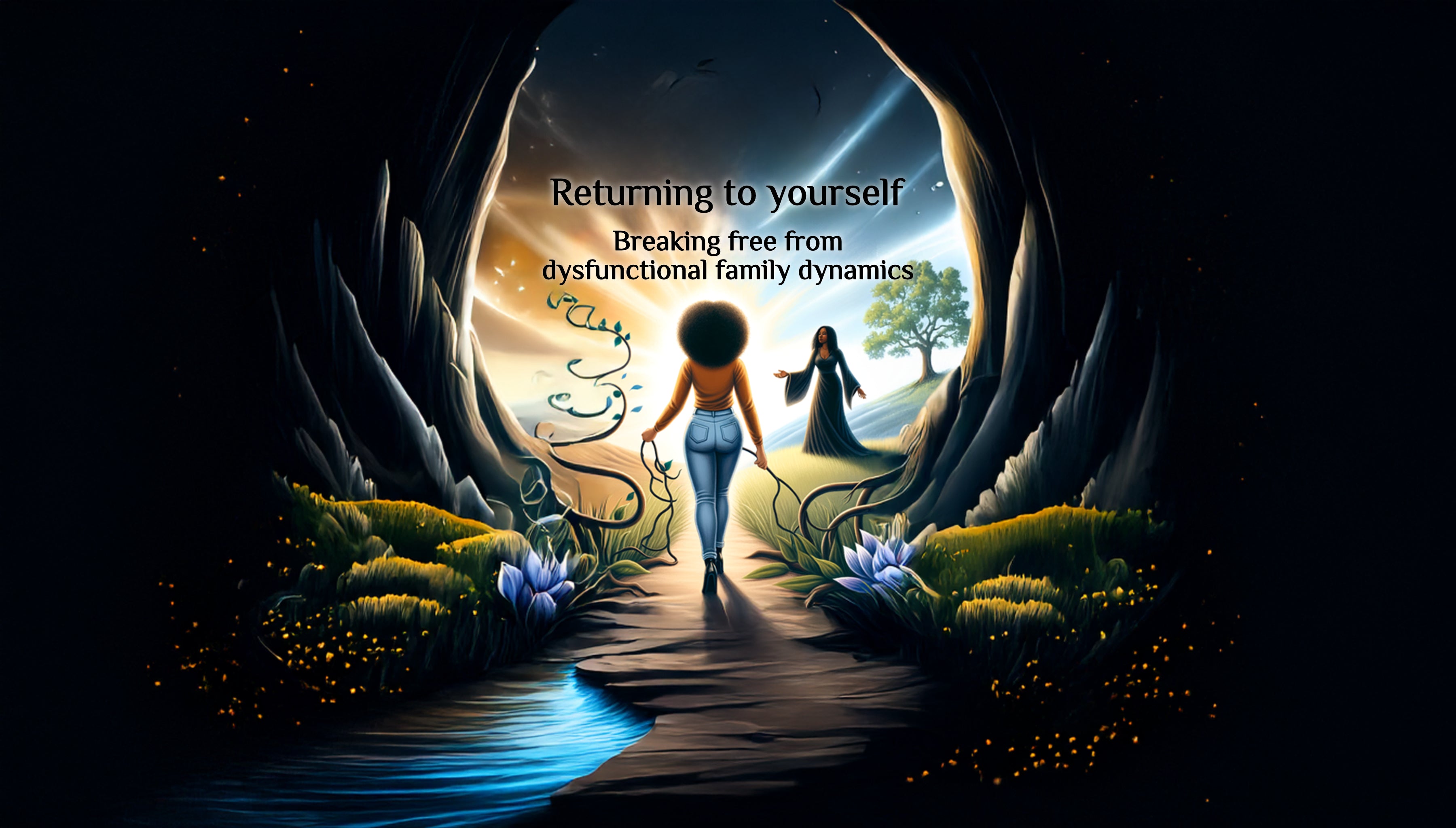In the world of romantic relationships, finding "the one" often feels like discovering a rare treasure.
The butterflies, the whirlwind of emotions, and the overwhelming attention can make us believe we’ve found someone truly exceptional.
But sometimes, what seems too good to be true… is exactly that.
You meet someone who seems to see straight into your soul.
The messages flood in.
You are being showered with attention and compliments.
He mirrors your dreams, your quirks, your pain.
He makes you feel special, cherished and deeply connected.
Within days, he’s talking about forever. It feels fated—like you’ve finally found “the perfect guy.”
This is where many women quietly slip from genuine connection into emotional entanglement—a sticky web of rapid intimacy, mixed signals, and nervous system highs and lows that can look like love, sound like love, and yet erode self-trust over time.
The aim of this blog is simple: to name the pattern without shame, show why it’s so alluring, and to offer a gentle route back to yourself.
The “Perfect Start” That Isn’t
When you first meet someone like this, you might feel as though you’ve stepped into a fairytale.
Things will start to feel intoxicating very early on, as they engage in a tactic known as “love bombing”.
Love bombing is designed to sweep you off your feet, blur your inner signals and establish a deep emotional connection as quickly as possible.
You may experience:
- Intensity on fast-forward: lots of affection and praises, constant texting, long late-night calls, gifts and grand declarations.
- Mirroring: he seems to share your values, tastes, wounds—almost too precisely.
- Future-faking: early talk of trips, a shared home, marriage, children.
- Pedestal & destiny language: you’re “unlike anyone,” “meant to be,” “his miracle.” He will “wait for you” if you are not ready for a relationship.
While this attention feels exhilarating, it’s important to recognise that this isn’t intimacy; it’s overwhelm dressed as romance.
Real intimacy unfolds at a human pace, with curiosity, consistency, and care.
Why It Hooks Smart, Capable Women
Entanglement doesn’t happen because you’re naïve; it happens because you’re human:
- You’re wired for bonding. Warm attention releases chemicals that feel like safety.
- If you’re carrying old wounds—especially around being unseen, unchosen, or criticised—his early idealisation can feel like homecoming.
- Social stories about “grand passion” normalise emotional whiplash as proof of depth.
The dynamic exploits tenderness and longing.
That doesn’t make you weak; it makes you worthy of protection—especially from the parts of the story that target those longings.
Red Flags That Deserve Your Pause
Once you’re emotionally hooked, the dynamic begins to change – from adoration to control.
The person who once made you feel like the centre of their world starts to reveal their true intentions.
Here’s how this shift often manifests:
- Subtle Criticism: they begin to question your choices, appearance, or relationships—always under the guise of “helping” you. The compliments turn into backhanded remarks, leaving you second-guessing yourself.
- Inconsistent Behaviour: they go from adoring to critical without explanation. This unpredictability is a sign of manipulation.
- Isolating You: they express concerns about or discourage you from spending time with friends/family, or try to monopolise your time.
- Feeling Drained: Healthy relationships energise you. If you feel emotionally exhausted or constantly on edge, something is wrong.
- Boundary testing: they nudge past your “no,” then frames it as romance or misunderstanding.
- Gaslighting & blame-shifting: they frame your concerns as “overreactions” and you end up apologising to keep the peace.
- Intermittent reinforcement: a “push-pull” dynamic where you experience occasional tenderness that resets the hope, keeping you hooked on returning to the heady rush of the love-bombing stage.
Inside your body, this feels like adrenaline love—spikes of euphoria followed by anxiety, rumination, or crash. Your nervous system learns to read chaos as chemistry.
If any of this rings true, your body is already whispering the truth.
What’s Really Happening: Entrapment of Attention
Emotional entrapment isn’t a metal cage; it’s a loop—your attention caught between the memory of his best moments and the fear of losing them.
You work harder.
You explain more.
You try to earn the version of him you met at the beginning.
Meanwhile, your own voice gets quieter.
This is the “cost” of entanglement: not just heartbreak, but the gradual outsourcing of your inner guidance to someone else’s approval, availability, or mood.
Why It’s Hard to Leave
One of the most challenging aspects of these relationships is how deeply entangled you become. By the time the toxicity reveals itself, you’re already emotionally invested.
You’ve been conditioned to believe that this person is your soulmate, and you may feel a deep attachment to the “fantasy” version of them from the beginning.
Additionally:
- The highs and lows create a cycle of dependency. After an argument or period of distance, their love bombing might return, reinforcing your belief in the relationship.
- They often make you feel as though you’re the only one who can “fix” or “save” them, playing on your empathy and commitment.
Returning to Yourself (Without Drama)
You don’t need a confrontation scene to reclaim yourself. You need clarity, pacing, and support.
· Slow the timeline
“I like getting to know you. I’m moving at a pace where my body stays calm.” Healthy interest respects tempo. Pressure is data.
· Move from words to evidence
Keep a simple log: what he says vs. what he does. Not to punish—just to see clearly. Reality is regulation.
· Reinstate your anchors
Sleep, food, movement, time outside, work you care about, trusted friends. Entanglement loosens when your life widens again.
· Rebuild boundaries
Think micro-boundaries: “I turn my phone off at 9 pm.” “I don’t discuss big decisions by text.” You don’t need permission to keep what keeps you well.
· Stop over-explaining
Explanations often feed the loop. Short, kind statements protect your energy: “This doesn’t work for me.” “I’m taking space.”
· Seek steady mirrors
A therapist, coach, or grounded friend can reflect you back to yourself. Entanglement thrives in isolation; it dissolves in community.
The test is simple: do I feel more myself here or not?
A Final Word of Courage
If you recognise yourself in any of this, you’re not broken—you’re waking up.
The very awareness that something is off is evidence of your strength returning.
Let it guide you.
Choose slowness over spectacle, reality over fantasy, and self-respect over intensity.
The right person won’t need you to abandon yourself to be loved.
And if a connection arrives on a pedestal, dazzles you breathless, and demands speed over substance…..
Trust the quiet voice within. It has always been your truest compass.
If it feels too good to be true, slow down, return to yourself, and ask, ‘Is this real?’
Remember, true love doesn’t feel like being caught in a whirlwind—it feels like coming home.
The right partner will never need to manipulate you into loving them.
They’ll meet you where you are, at your own pace, and build something real—together.



Share: